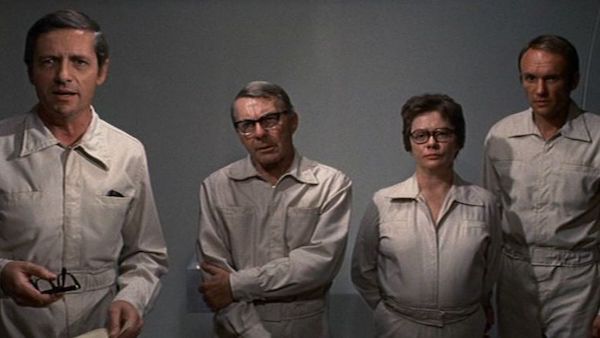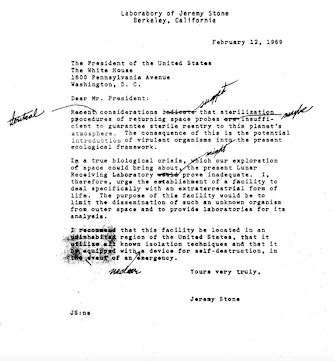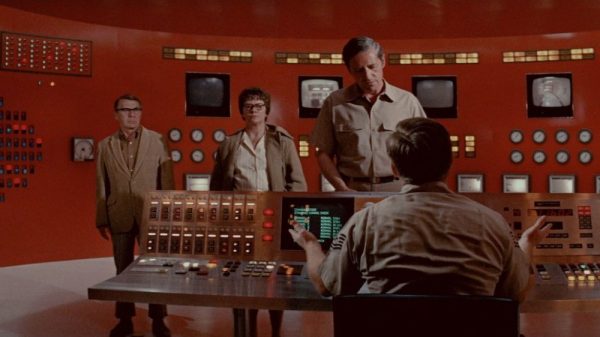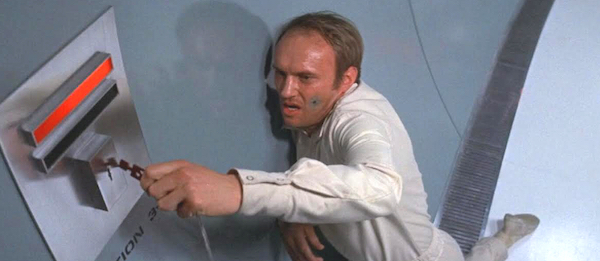1971 Project Film Commentary: “The Andromeda Strain” — Science Is the Enemy?
By Michael Marano
The Andromeda Strain’s anti-intellectualism is rooted in Cold War paranoia: a distrust of science, of academia, and of the press.

The eggheads who save the world in The Andromeda Strain. But can we trust them?
A scene in 1971’s The Andromeda Strain, director Robert Wise’s suspense classic about a team of scientists fighting a rapidly mutating and highly contagious extraterrestrial infection, dovetails with the antiscience fervor that drove Trump’s mishandling of the Covid outbreak (at the cost of more than 500,000 American lives). And that scene is rooted in something that happened 20 years before that, when Tail Gunner Joe McCarthy set his sights on the same type of pointy-headed, elitist intellectuals.
The encounter comes in the film’s third act, when the team of scientists (including at least one Nobel laureate) discover that the deadly alien pathogen they are studying can replicated by using any source of energy. Earlier, the scientist’s team leader, Dr. Jeremy Stone (Arthur Hill), had recommended that Piedmont, NM (pop 68), site of the first human exposure to the pathogen, be nuked under “Directive 7-12.” The hope was to keep the pathogen — which drives some of its victims insane before it kills them — from spreading. The off-screen US president is Richard Nixon (the film’s time frame is February 1971), who initially balks at the recommendation. Dropping a nuke on a village of (albeit dead or crazed) American civilians isn’t the problem. “The President’s main concern is the international consequences,” explains Grimes (Richard O’Brien), a presidential aide. Specifically, all hell might break loose attempting to explain to the Soviets why the US detonated a nuke in violation of the 1963 Moscow Treaty. Nixon later agrees to go ahead with Directive 7-12, but by then the scientists beg to have the order annulled because it turns out the pathogen, code named the Andromeda Strain, would thrive on the radiation. The presidential science advisor, Dr. Robertson (Kermit Murdock), explains to Grimes, “The Bomb would only provide a fantastically rich growth medium. Understand?”
“No, but I’ll pass along the recommendation,” says Grimes, who seems proud to not understand, while looking exactly like the guys who in a few years would be called before the Senate Watergate Hearings in their shitty Brooks Brothers suits and shittier haircuts. He then grins a mouthful of Pall Mall–stained teeth and chuckles at the scientists. “The boss’ll be pleased to know he made the right decision on 7-12 in the first place!” he says, bursting with schadenfreude that the scientists were wrong, aglow that the goddamned smarty-pantses had to reverse themselves. Nixon was right, if for all the wrong reasons. Earlier, when warned that the Andromeda Strain could become a worldwide epidemic, Grimes had said, “It’s because of rash statements like that the President doesn’t trust scientists!”
This moment crystallizes the anti-intellectualism and anti-elitism of Nixon and his cronies. Yes, Nixon entrusted his foreign and domestic policies to two Harvard professors, Henry A. Kissinger and Daniel Patrick Moynihan. But he railed against “Harvard men” and openly resented JFK for going to Harvard, and reached out with pride to “the Silent Majority” and “Hard Hats.” As columnist Max Boot said to PRI’s The Takeaway in 2016: “It’s actually been part of the Republican Party brand for a long time, to be the ‘Just Folks’ Party. Republicans going all the way back to [Dwight D.] Eisenhower have masqueraded by pretending to be dumber than they actually were by attacking elite intellectuals and snobs and so forth trying to identify with the common man. This was a strategy pursued by Richard Nixon, by Ronald Reagan, and by George W. Bush.”
In keeping with his boss’s rhetoric, Nixon’s VP, Spiro Agnew, said in a campaign speech delivered in New Orleans on October 19 1969: “The student now goes to college to proclaim, rather than to learn. The lessons of the past are ignored and obliterated… a contemporary antagonism known as ‘The Generation Gap.’ A spirit of national masochism prevails, encouraged by an effete core of impudent snobs who characterize themselves as intellectuals.”
It’s worth noting that Andromeda‘s Dr. Stone teaches at UC Berkeley, then (and now) a hotbed of the very “masochism” Agnew attacked. As if to underline that point, the film features a closed hearing of the Senate Committee on Space Science. During the discussion, a conservative-leaning senator (and obvious Nixon ally) approves that Stone, that impudent snob from Berkeley, was kept out of the loop regarding a NASA project directly related to his work for reasons of national security. “Very smart!” snaps the jowly Senator (Eric Christmas). “We’ve had experiences with scientists before!”

Stone’s letter to Nixon in The Andromeda Strain.
It’s plain the experts, the educated, the scientifically literate, are not to be trusted. A dig at Oppenheimer’s and Einstein’s opposition to the Bomb that they had helped create? Probably…given that the Bomb was partly instigated at the behest of Einstein via a letter he sent to the US president. Project Wildfire, the secret lab where The Andromeda Strain‘s hero scientists study the pathogen, was created at the behest of Dr. Stone in a letter written to Nixon, a copy of which is in the hand of the aforementioned senator as he discusses the untrustworthiness of scientists. And, like Einstein’s formulations, the workings of the Andromeda Strain turn out to be a scientific breakthrough that the US Government intends to develop as a weapon of mass destruction.
All this distrust of the educated, the smart, the competent, the scientifically trained was summed up by the ’50s pejorative term “egghead.” The nefariousness of the “egghead” had been a major element in Joe McCarthy’s red-baiting rhetoric. On July 9, 1952, while campaigning for Ike and Trickie Dickie at the Republican National Convention in Chicago, McCarthy proclaimed, “One Communist on the faculty of one university, is one Communist too many! [Y]ou are seeing today an all-out attempt to marshal the forces of the opposition, using not merely the Communists, or their fellow travelers–the deluded liberals, the eggheads [italics mine], and some of my good friends in both the Democratic and Republican Parties who can become heroes overnight in the eyes of the left-wing press, if they will just join with the jackal pack.”
McCarthy’s former chief consul for his Senate Permanent Subcommittee on Investigations, a plucky young lad by the name of Roy M. Cohn, applied the term “egghead” to members of the press whose readership included liberal educated types (the instigators of what today would be called “Fake News”). In a speech in December 1954, Cohn attacked what he saw as left-wing (and therefore Communist-leaning) bias in the mainstream media, what he called “the egghead press.” He praised the more conservative papers in New York for having larger readerships than the papers he deemed not anti-Communist enough. (Thus anticipating Trump’s rhetoric — higher ratings means more truthiness.)
Trump’s mentor, of course, was McCarthy’s protégé Roy M. Cohn, who would go on to die in 1986 of AIDS, a pathogen that at the time of The Andromeda Strain‘s release would have seemed the stuff of science fiction.

Scientists doing smart, but scary, things in The Andromeda Strain.
The Andromeda Strain reveals a confluence of anti-intellectualism going back to early ’50s Cold War paranoia: the distrust of science, of academia, and of the press. The career arc of the film’s director, Robert Wise, bridges the anti-intellectualism of the ’50s to that of the ’70s. His previous science fiction film was 1951’s The Day the Earth Stood Still, which, with its anti-nuke message, echoed the very sentiments that McCarthy et al. would use to attack those damned peacenik intellectuals. The Day the Earth Stood Still also featured Sam Jaffe as Professor Jacob Barnhardt, a very thinly disguised Albert Einstein, whom the Republican senator in The Andromeda Strain implies was part of the brood of untrustworthy brainiacs.
The Andromeda Strain, like the 1969 Michael Crichton novel on which it is based, besides forecasting today’s antiscience prejudice, stands out as one of the first, if not the first, narratives about an outbreak or health threat to focus on the scientists mobilized to thwart disaster. 1965’s The Satan Bug was a spy thriller about the release of a germ warfare pathogen. As was the 1969 James Bond film On Her Majesty’s Secret Service, in which Blofeld develops bio-weapons, following in the footsteps of Fu Manchu in the 1933 Sox Rohmer novel, The Bride of Fu Manchu. Elia Kazan’s 1950 movie Panic in the Streets is a full-on film noir about New Orleans cops tracking down crooks carrying pneumonic plague.

Battered and bruised. The Andromeda Strain‘s version of Fauci in action?
In those earlier stories, if any scientists were present, they weren’t the heroes. Maybe they held clipboards and adjusted their horn-rimmed glasses as they educated the tough-guy heroes by ladling out exposition, or they were in the villains’ labs, spawning the pathogens. The Andromeda Strain is filled with eggheads from the same carton derided by McCarthy, Cohn, Agnew, and Trump. They are front and center and, more importantly, they act like scientists — they are thorough, precise and, above all else, smart. Their closest antecedent would be Prof. Bernard Quatermass in Nigel Kneale’s brilliant series of science fiction thrillers for TV and film. But Kneale’s Quatermass series were less about teams of scientists than they were about Prof. Quatermass being a maverick thinker.
There is a direct line between the political demeaning of scientists in The Andromeda Strain and Trump’s ignorant dismissal of Fauci and other experts’ advice in the face of a pandemic. It is an infection that, like the Andromeda Strain, drives some of those tainted by it insane.
Since 1990, Michael Marano (www.michaelmarano.com) has been covering film for the nationally syndicated Public Radio Satellite System program, Movie Magazine International, which airs in 111 markets in the US and Canada. He’s provided film reviews and pop culture commentary for a variety of national publications, and Tweets at @MikeMarano

An excellent analysis — thanks.I might add that this anti-science bias came in tandem with a vilification of unionism — also a long-term Republican strategy. Scientists themselves were not particularly associated with unions, but in the 1930’s to mid-40’s, pointy-headed intellectuals of many stripes were. The post-war Red-Hunt forced a schism in unions, many of which dissociated themselves with their long association with Communism. Unions were not only associated with the Red Menace but,just to make sure all bases were covered, gangsterism. (see 1954’s On the Waterfront“).
Distrust the press and the Federal government? Now why would any thinking American want to do that?